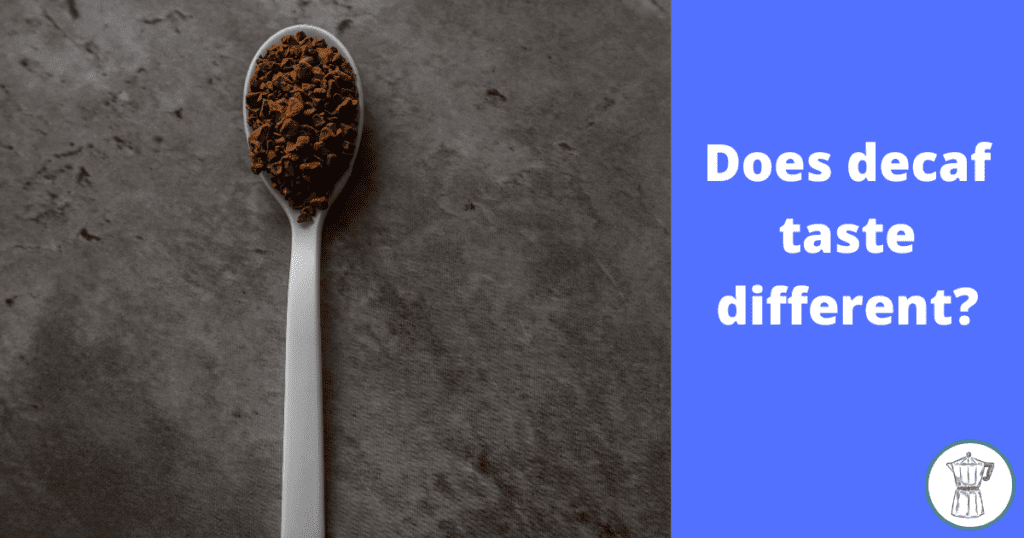Does decaf taste different?
This is what I was wondering before really getting into decaf coffee. It’s a common question among coffee lovers who are trying to cut down their caffeine intake, especially if they suffer from anxiety and insomnia. Stick around, in this guide I’m going through interesting decaf facts and sharing my view on the taste of decaf coffee.
Let’s get started.
Does decaf coffee taste different?
No, regular and decaf coffee taste almost the same; you can’t really tell the difference. Perhaps decaf coffee is slightly more sour, but this also depends on the decaffeination process. The main difference between the 2 is the caffeine level as decaffeinated coffee has almost 0 caffeine.
Main differences between regular and decaf coffee
Let’s talk about the main differences between regular and decaf coffee:
- Regular coffee contains caffeine, for example, a small coffee cup has around 109mg of caffeine while the same amount of a decaf cup contains only 8-14mg.
- Decaffeination removes around 97% of the caffeine in coffee beans
- There are different ways of decaffeination
- Decaf coffee is slightly less acidic than regular coffee although this depends on the variety of coffee (light, medium or dark roast)
What about the similarities between the 2?
Like I said decaf and regular coffee taste pretty much the same – you have to be a real coffee connoisseur to tell the difference between the 2. Another similarity is that both contain antioxidant properties that help you cleanse your body.
Does decaf coffee have as much energy as regular?
Let’s face it many of us drink coffee to kick-start the date.
But does decaf coffee gives you as much energy as regular coffee?
The short answer is: No it doesn’t
For example, a non-decaf single espresso contains around 80mg of caffeine which most of the time is enough to get you going for hours. As already mentioned decaf coffee has less than 10mg, so the energy level that gives you is very little or even non-existent.
If your list to do is pretty long and planning to stay until late in the office to catch up with your work decaf coffee isn’t the best option.
What is decaffeination? What are the most common ways of decaffeination?
Simply put, decaffeination is the process of removing over 95% of the caffeine in coffee beans, so anyone tolerant to caffeine can still enjoy it.
History of decaffeination
Do you think decaffeination is something new?
It was first invented by a German coffee seller called Ludwig Roselius who was the owner of Kaffee HAG back in 1903. At the start, it was known as the Roselius method.
The process back then wasn’t the healthiest one as brine was used to steam the beans and then solvents mainly benzene was applied to remove the caffeine in the beans.
Since then new ways and way healthier have been invented which I’m going to talk about in the next section.
Let’s go over the most common methods of decaffeination to get a better understanding.
Swiss water process
This is one of the most popular methods and most effective.
This chemical-free process follows the steps below:
Green coffee beans are soaked in hot water for hours which removes up to 97% of the caffeine in the beans.
Then the normal process of roasting is followed (the same with regular coffee beans) and then the coffee beans are packed.
Carbon Dioxide process
This is a costly yet eco-friendly and effective method for removing the caffeine from coffee beans.
As you might have already guessed Carbon Dioxide is used in this method to remove the caffeine from coffee beans.
The process goes as follows: green coffee beans are put in a high-pressure large container where they are exposed to CO2, and in this way, the caffeine is removed.
Direct solvent method
This is another effective decaffeination method where chemicals are used.
Solvents are used in this case to remove the caffeine from coffee beans. Back in the day the solvent that was most commonly used was benzene which was harmful and was banned. Nowadays, the most common solvents are ethyl acetate and methylene chloride.
The process goes like this: Initially, green coffee beans are steamed to open pores to make the caffeine removal easier, and then they are soaked in solvents for some time. They are washed and rinsed to ensure the taste of solvents is completely gone. After that, the usual roasting and packaging follow.
Indirect solvent method
This way is regarded as a healthier way of decaffeination than the direct solvent method.
Similar to the Swiss water process green coffee beans are soaked in hot water where the caffeine is extracted. The coffee beans are removed and the water is mixed up with solvents and it’s left for hours until the caffeine and solvents are evaporated. The last step of the process is to put the coffee beans back in the water to absorb the flavours and aromas.
Is decaf coffee an overall better option?
The short answer is: It really depends
If you want to be a productivity beast and get done a lot during the day, regular coffee is a better option, simply because it really boosts your energy.
But if you want to have a nice cup of coffee with a slice of your favourite cake in the evening, it’s wise to go for decaf coffee to avoid nervousness and insomnia.
It also depends on how tolerant your body is to caffeine.
For example, I can’t drink too many cups a day as I keep staying up at night struggling to go to sleep. Whereas my girlfriend has no issues drinking a bucket of coffee every day and going to sleep with no issues.
If caffeine causes you anxiety and nervousness, consider cutting down your
caffeine intake.
Let’s wrap it up
Still wondering if decaf tastes different? If so, I suggest you scroll up and reread bits of the text to get a better understanding. This is what I’ve got for you for now. Stay tuned, there are going to be more articles on decaf coffee as it’s becoming more popular.
FAQ
Do you still have a burning question? All your questions are answered in this section. Let’s take a look.
Does decaf coffee have caffeine?
Yes, decaf coffee contains caffeine as during the decaffeination (the process in which caffeine is removed from coffee beans) around 97% of caffeine is removed, meaning that there’s still 3% of the caffeine in them which is little but still there is caffeine.
Is it worth switching to decaf?
It really depends on you. If you find it difficult to go to bed at night the days you had gulped down many espressos I suggest you switch to decaf for some time to give your body a break from excessive amounts of caffeine – you can even mix them up and go for decaf coffee in the evening. But if you have too many tasks on your to-do list it’s wise to opt for a regular cup of coffee as it’s really going to give you a good kick and keep you going for hours.

- How to Remove Coffee Stains From Countertop The Easy Way - December 21, 2023
- Can You Reuse Coffee Grounds in French Press? Truth Inside - December 12, 2023
- Can Expired Coffee Creamer Make You Sick? 3 Ways to Find Out - December 9, 2023
